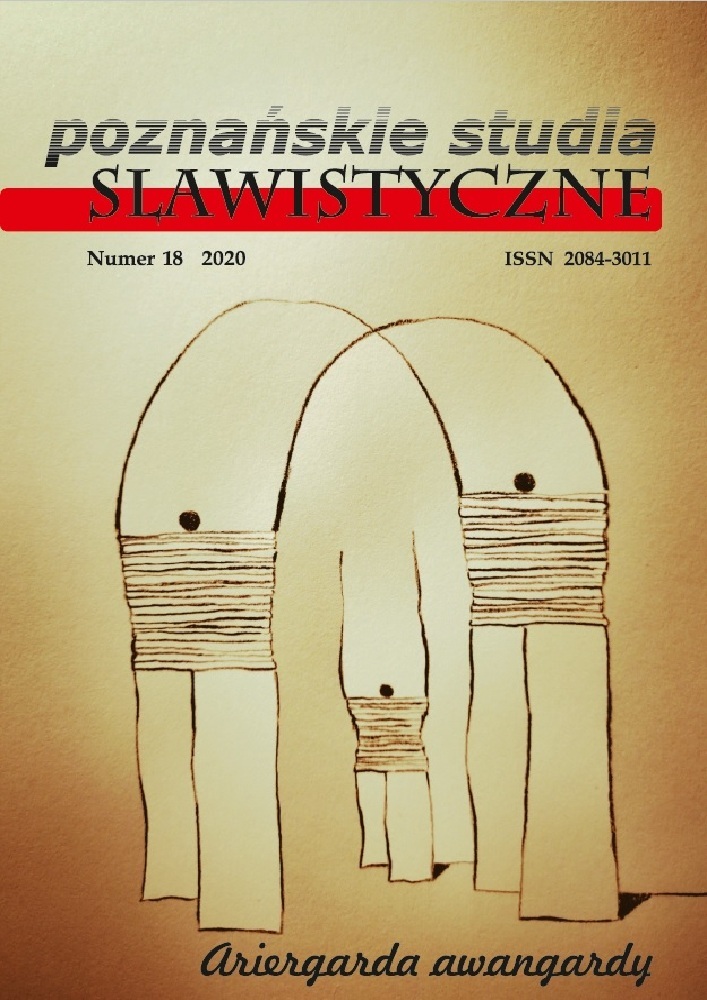Abstract
In the centre of the article’s interest, there are the expressionist ideas present in the work by Croatian writer from the inter-war period (1893–1941). The mini-novel/novella in question entitled Tonkina jedina ljubav (1931) is considered the work belonging to the epoch of the new/social realism which dominated in the 1930s, however, the author, as is shown on the basis of the article’s research, did not managed to free himself from influence of expressionism that shaped the most Croatian consciousness as for the avant-garde historical time (1910–1930). Focusing attention on a disabled woman along with her small-town environment of Zagreb before the World War I, the author draws her exaggerated, cartoonish portrait which has little to do with the realistic and mimetic reflection of reality. The work is a kind of aesthetic and ethical provocation, and serves as unmasking the idyllic image of Zagreb which turns out to be a city inhabited by intolerant and narrow-minded society convinced, however, of its civilisation superiority. The titular character is a victim of this society, and at the same time she remains its part. The aesthetic and ethical provocation concerns the disabled woman together with „inefficient” society living in the terrifying city.
References
Becker, S. (2000a). Neue Sachlichkeit. Bd. 1: Die Ästhetik der neusachlichen Literatur (1920–1933). Köln: Böhlau.
Becker, S. (2000b). Neue Sachlichkeit. Bd. 2: Quellen und Dokumente. Köln: Böhlau.
Becker, S., Weiß Ch. (Hrsg.). (1995). Neue Sachlichkeit im Roman. Neue Interpretationen zum Roman der Weimarer Republik. Stuttgart: Metzler. https://doi.org/10.1007/978-3-476-03575-2.
Boškov, Ž. et al. (ur.) (1971). Jugoslovenski književni leksikon. Beograd: Matica Srpska.
Butler, J. (2006). Krytycznie Queer. W: Teorie literatury XX wieku. Antologia. Red. A. Burzyńska, M.P. Markowski. Tłum. A. Rzepa. Kraków: Wydawnictwo Znak, s. 530–550.
Cesarec, A. (1997). Tonkina jedina ljubav. Sin domovine. Oprac. H. Sablić. Vinkovci: Riječ.
Czapik-Lityńska, B. (1996). „Jeszcze-nie”. Utopicum jugosłowiańskiej awangardy. Katowice: Wydawnictwo Uniwersytetu Śląskiego.
Flaker, A. (1984). Poetika osporavanja. Avangarda i književna ljevica. Zagreb: Školska knjiga.
Flaker, A. (1986). Stilske formacije. Zagreb: Sveučilišna naklada Liber.
Gazda, G. (1987). Awangarda – nowoczesność i tradycja. Łódź: Wydawnictwo Łódzkie.
Genette, G. (1972). Figures III. Paris: Le Seuil. Grüttemeier, R., Beekman, K., Rebel, B., (eds) (2013). Neue Sachlichkeit and Avant-Garde. Avant-Garde Critical Studies 29. Amsterdam – New York: Rodopi. https://doi.org/10.1163/9789401209090.
Hutnikiewicz, A. (1988). Od czystej formy do literatury faktu. Warszawa: Wiedza Powszechna.
Jakowska, K. (1992). Naturalizm w polskiej powieści międzywojennej. „Pamiętnik Literacki” 83/3, s. 61–94.
Kornhauser, J. (1994). Literatury zachodnio- i południowosłowiańskie XX wieku w ujęciu porównawczym. Kraków: Wydawnictwo Uniwersytetu Jagiellońskiego.
Kornhauser, J. (2005). Reinterpretacja tradycji w postjugosłowiańskich pracach historycznoliterackich. W: W poszukiwaniu nowego kanonu. Reinterpretacje tradycji kulturalnej w krajach postjugosłowiańskich po 1995 roku. Red. M. Dąbrowska- -Partyka. Kraków: Wydawnictwo Uniwersytetu Jagiellońskiego, s. 423–472.
Markiewicz, H. (1957). Spór o naturalizm. W: Tradycje i rewizje. Kraków: Wydawnictwo Literackie, s. 195–232.
Michalski, S. (1994). New Objectivity. Cologne: Benedikt Taschen.
Milanja, C. (1995). Ulderiko Donadini i ekspresionizam. (Ekspozitorni tekstovi i pjesnički diskurs). „Republika” nr 3–4, s. 105–119.
Milanja, C. (2000). Pjesništvo hrvatskog ekspresionizma. Zagreb: Matica hrvatska.
Mitosek, Z. (2002). Mimesis – między udawaniem a referencją. „Przestrzenie Teorii” 1, s. 25–46. https://doi.org/10.14746/pt.2002.1.2.
Nemec, K. (2002). Hrvatska ekspresionistička proza. W: Ekspresionizam u hrvatskoj književnosti i umjetnosti. Red. C. Milanja. Zagreb: altaGAMA, s. 85–96.
Pająk, P. (2003). Kategoria rozpadu w chorwackiej prozie awangardowej. Warszawa: Elipsa.
Peternai Andrić, K. (2019). Pripovijedanje, identitet, invaliditet. Zagreb: Intermedia.
Pieniążek-Marković, K. (2019). Karneval s mrtvacima (Miroslav Krleža Kraljevo). „Slavica Wratislaviensia” nr CLXVIII, Wielkie tematy kultury w literaturach słowiańskich 13, Tanatos 2, s. 495–505.
Poggioli, R. (1962). Teoria dell’arte d’avanguardia. Bologna: Il Mulino.
Rybkowska, A. (2015). Nowa Rzeczowość w perspektywie teorii awangardy Petera Bürgera. „Estetyka i Krytyka” 38 (3/2015), s. 87–105.
License
Copyright (c) 2020 Krystyna Pieniążek-Marković

This work is licensed under a Creative Commons Attribution-NoDerivatives 4.0 International License.

